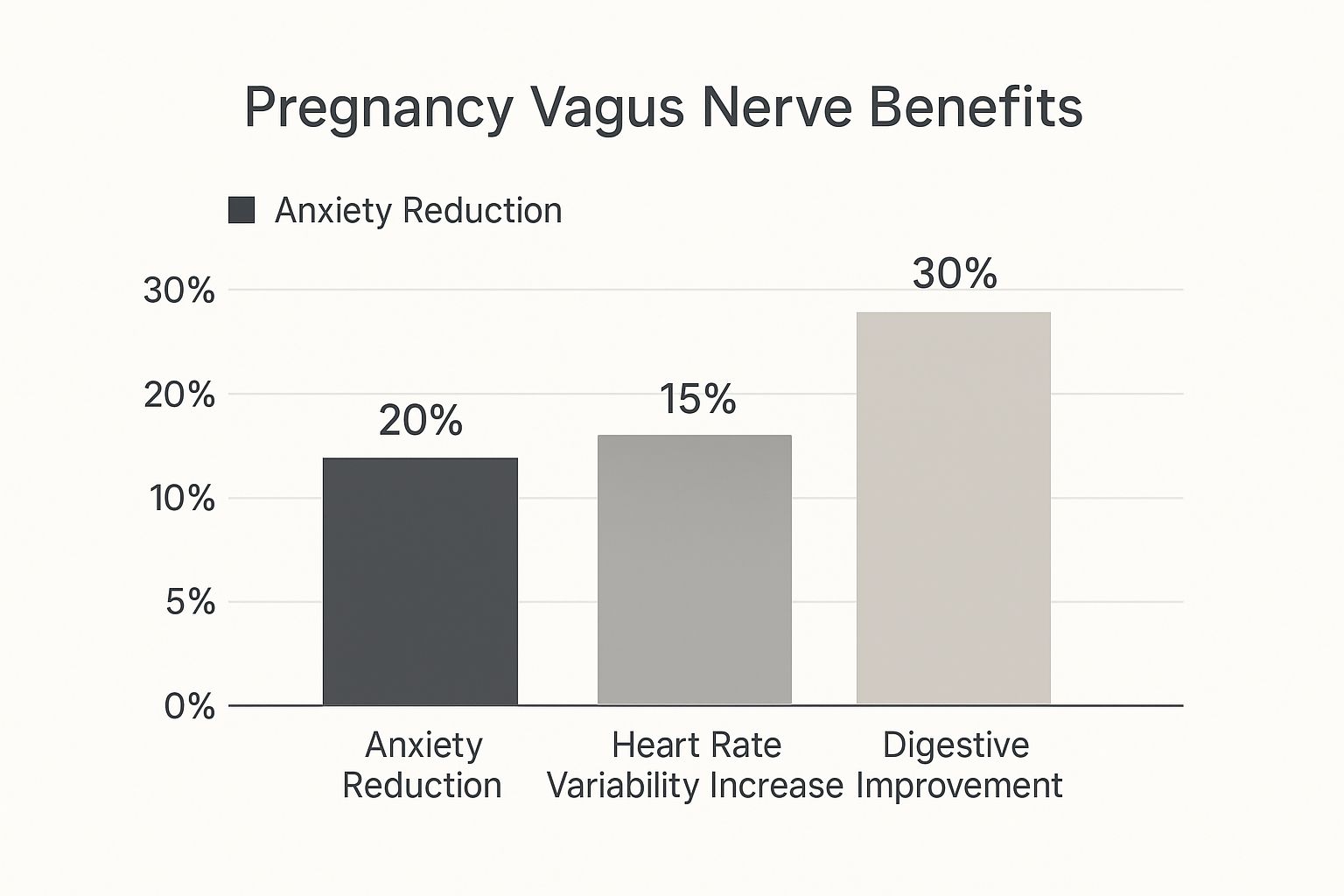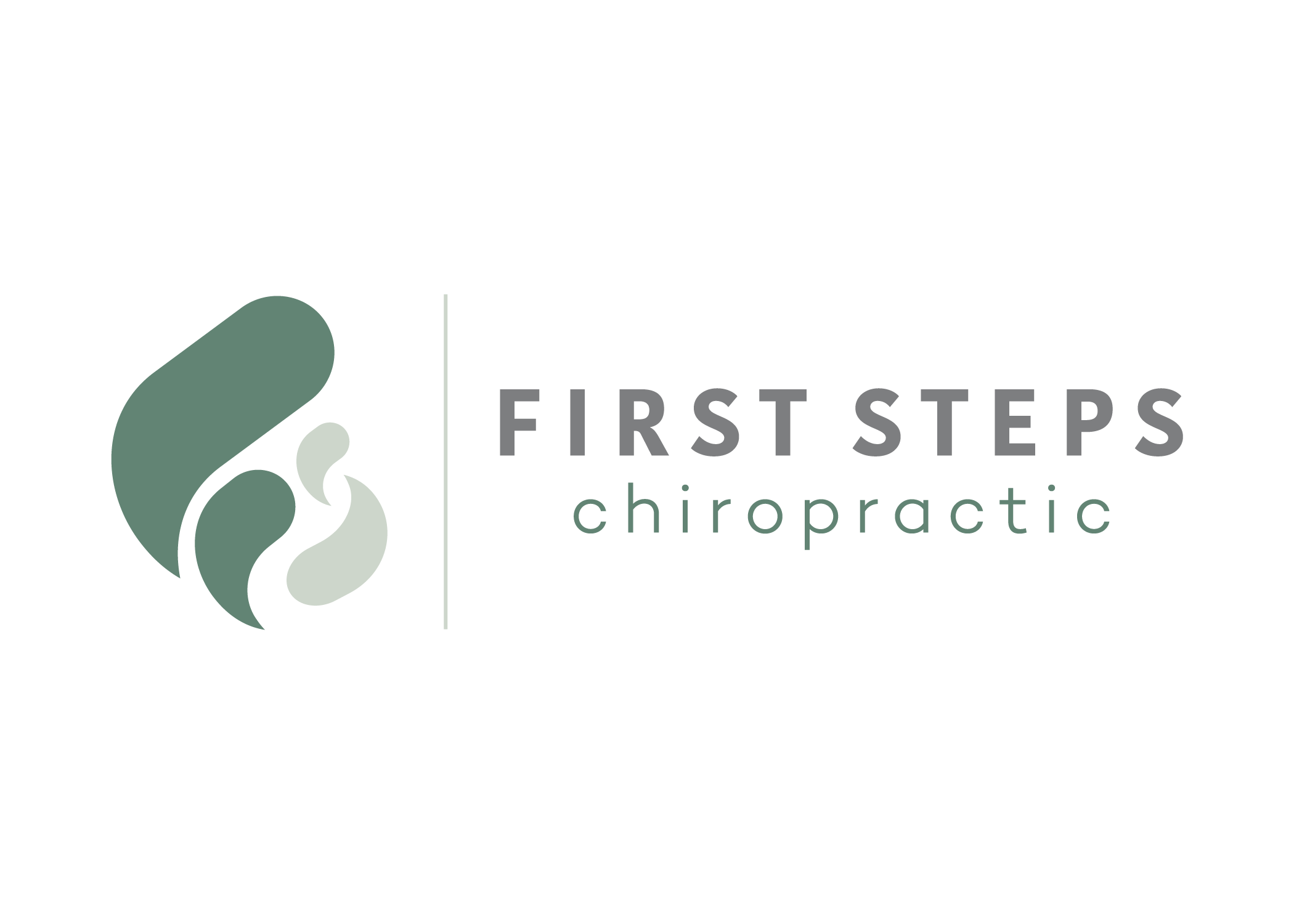When we talk about the vagus nerve and pregnancy, we’re touching on one of the most incredible connections in the body. This single nerve is a major player, influencing everything from your stress levels and inflammation to your baby's development. Think of it as a central communication highway that helps your body manage the massive job of growing a new human.
Your Vagus Nerve Is a Key Player in Your Pregnancy
Your nervous system basically has two modes: a gas pedal and a brake pedal. The "gas pedal" is your sympathetic nervous system—it's what kicks in for that "fight-or-flight" response, getting you ready for action. Your "brake pedal" is the parasympathetic nervous system, which is all about resting, digesting, and recovering. The vagus nerve is the star player of this braking system.
It’s like the master conductor of your body’s internal orchestra, sending signals from your brain to your vital organs, telling them when it's time to slow down and function calmly. During pregnancy, your body is under an immense amount of physical and emotional stress. A healthy, well-functioning vagus nerve is what allows you to hit the brakes when you need to, keeping your system from getting stuck on high alert.
What Is Vagal Tone?
You might hear the term vagal tone—it's just a way of describing how active your vagus nerve is. Essentially, it’s a measure of your nervous system’s ability to bounce back from stress. Someone with a high vagal tone can shift from a stressed state to a calm one with relative ease.
A high vagal tone is like having a really responsive braking system in your car. It lets you slow down smoothly and quickly when you need to, making the whole journey safer and more controlled. Low vagal tone is more like having worn-out brakes—you struggle to slow down, and the ride feels a lot more jarring and stressful.
This internal balance is especially critical during pregnancy. The signals your vagus nerve sends directly impact several key systems that are working overtime to support a healthy pregnancy.
Why Vagal Tone Matters for You and Your Baby
Keeping your vagal tone healthy isn't just about feeling less stressed; it actually helps create a more stable and nurturing environment for your developing baby. When your nervous system is well-regulated, it helps manage your body's inflammatory response, supports better digestion and nutrient absorption, and promotes emotional well-being.
Here’s a quick breakdown of why it’s so important:
- Stress Resilience: A high vagal tone helps your body better handle cortisol, the main stress hormone. This means less stress passed on to your baby.
- Inflammation Control: The vagus nerve naturally helps calm inflammation, which is vital for maintaining a healthy environment inside the womb.
- Maternal-Fetal Connection: A calm, regulated nervous system in mom can positively shape the baby's developing stress response system, even before they’re born.
At the end of the day, understanding the link between the vagus nerve and pregnancy gives you the power to support your body’s natural ability to adapt and thrive. It’s a central piece of the puzzle for a more balanced, comfortable, and connected pregnancy experience.
Understanding Your Body’s Information Superhighway

To really get what the vagus nerve and pregnancy have to do with each other, we need to think beyond abstract ideas and actually map out its physical journey. This isn't just a single nerve; it's a massive, wandering network that truly lives up to its nickname, the "wandering nerve," because of its extensive path.
Picture a complex superhighway that starts at the very base of your brain, in the brainstem. From there, it travels down through your neck, branching out to connect with your heart, lungs, and the entire digestive system. This isn't a one-way street, either—it’s a busy, two-way highway carrying a constant flow of information back and forth.
In fact, about 80% of the nerve fibers in the vagus nerve are sensory, which means they’re sending updates from your body up to your brain. This constant feedback loop is how your brain stays in the loop about your heart rate, breathing patterns, and even what’s happening in your gut.
Your Three Nervous System States
To make this a bit easier to grasp, let's look at it through the lens of polyvagal theory, which breaks down our nervous system's responses into three main states. Think of these as different traffic conditions on that internal superhighway, each one setting the tone for how you feel and react.
-
Ventral Vagal (Social Engagement): This is your green light—traffic is flowing smoothly. When this part of your nervous system is in charge, you feel safe, calm, and connected to others. Your heart rate is steady, your breathing is deep, and you can easily engage. This is the ideal state for rest, healing, and connection—all things that are so important during pregnancy.
-
Sympathetic (Fight or Flight): This is the sudden yellow light or an unexpected traffic jam. When your brain senses a threat—whether it’s a real danger or just a stressful email—it hits the gas on this response. Your heart starts racing, your muscles tense up, and your body gets ready for action. While it’s crucial for survival, getting stuck here leads to chronic stress.
-
Dorsal Vagal (Shutdown): This is the red light, a complete gridlock. It’s a last-resort response when you feel trapped and helpless. This ancient part of the vagus nerve can trigger a shutdown, which can feel like being numb, disconnected, or utterly exhausted. It’s a state of conservation and collapse.
Understanding these states is so important because a healthy, well-toned vagus nerve allows you to shift between them when you need to. During pregnancy, the goal is to spend as much time as possible in that calm, connected ventral vagal state to create a peaceful environment for your growing baby.
The Vagus Nerve’s Role in Pregnancy Maintenance
The vagus nerve’s job goes far beyond just managing stress; it plays a direct, hands-on role in the mechanics of pregnancy and labor. It's the primary regulator for the autonomic functions of all your internal organs, which are working overtime to support both you and your baby.
The vagus nerve is like the body's chief operating officer, making sure all the different departments—from cardiovascular to digestive—are working in sync. When that communication is clear, the whole system runs more smoothly, which is exactly what you need during the demanding months of pregnancy.
Research in animals really drives home how critical this connection is. Studies have shown that the vagus nerve's signals are essential for managing inflammation and keeping the organs crucial for carrying a pregnancy to term functioning properly. This shows a deep physiological link between a healthy nervous system and a successful pregnancy. You can learn more by exploring research on the vagus nerve’s role in pregnancy maintenance.
This whole process is a beautiful example of nervous system regulation, where your body is constantly adapting to stay balanced. The stronger your vagal tone, the better your body can handle this complex job. You can explore more about what nervous system regulation is in our detailed guide. By understanding this information superhighway, you can see why supporting it is one of the best things you can do for a healthier pregnancy.
How Vagal Tone Shapes Your Pregnancy Experience
Now that we know the vagus nerve is the body's communication superhighway, let's talk about how its performance—what we call vagal tone—directly shapes your pregnancy. High vagal tone isn't just about feeling calm; it kicks off a wave of positive changes, building a healthier, more stable home for you and your growing baby.
Think of it like this: a body with high vagal tone is a well-tended garden. It’s resilient and has the resources to handle stressors, like a sudden storm. A body with low vagal tone is more like a garden in a drought—fragile, easily overwhelmed, and struggling to thrive. The link between the vagus nerve and pregnancy is all about nurturing that internal garden.
One of the best ways to measure this is through Heart Rate Variability (HRV). This is the tiny, natural variation in time between your heartbeats. A higher HRV is a fantastic sign of a healthy, adaptable nervous system. Good vagal tone directly boosts your HRV, showing your body can shift from stress to relaxation with ease.
The Vagus Nerve as Your Natural Anti-Inflammatory
During pregnancy, your immune system walks a fine line, and keeping inflammation under control is critical. The vagus nerve is a powerhouse here, acting as your body’s built-in anti-inflammatory crew. When it’s working well, it releases a neurotransmitter called acetylcholine that tells your immune cells to cool it and dial down the production of inflammatory proteins.
This process, known as the "inflammatory reflex," is crucial for keeping the uterine environment healthy. Research even suggests that a well-functioning vagus nerve may help lower the risk of inflammatory pregnancy complications, like pre-eclampsia, by keeping body-wide inflammation in check. When you support your vagal tone, you're helping your body manage this balance all on its own.
This infographic shows just how much better vagal function can improve key areas during pregnancy.

As you can see, boosting vagal tone can lead to big improvements in digestive health and a real drop in anxiety, highlighting just how much it affects your overall well-being.
The difference between a well-regulated and a dysregulated nervous system during pregnancy is significant. The table below breaks down how high and low vagal tone can lead to very different outcomes for both mom and baby.
How Vagal Tone Can Impact Pregnancy Outcomes
| Area of Impact | High Vagal Tone (Healthy Regulation) | Low Vagal Tone (Dysregulation) |
|---|---|---|
| Maternal Mood | Greater emotional resilience, reduced anxiety and depression. | Increased risk of mood swings, anxiety, and prenatal/postpartum depression. |
| Digestion | Efficient nutrient absorption, less indigestion, bloating, and constipation. | Frequent indigestion, acid reflux, and constipation due to poor gut motility. |
| Immune Response | Balanced inflammation, lower risk of inflammatory complications. | Heightened systemic inflammation, increased risk for conditions like pre-eclampsia. |
| Fetal Development | Stable, calm in-utero environment supports healthy nervous system wiring. | A stressed environment can program the baby's stress response for higher sensitivity. |
| Labor & Delivery | Better able to stay calm and manage stress, potentially smoother labor. | Difficulty relaxing, which can increase tension and complicate the labor process. |
Ultimately, nurturing a high vagal tone creates a foundation of health that supports a more comfortable pregnancy and gives your baby the best possible start.
Fueling Growth Through the Gut-Brain Axis
Your digestive system is working overtime during pregnancy to pull every last nutrient from your food for your baby. The vagus nerve is the primary director of the gut-brain axis, the two-way communication street between your digestive system and your brain.
High vagal tone makes sure that conversation is clear and effective. It helps regulate stomach acid, promotes the smooth muscle contractions that move food along, and supports the absorption of essential nutrients.
This directly translates to fewer common pregnancy complaints. A well-managed gut-brain connection can ease things like indigestion, bloating, and constipation, making you more comfortable while ensuring your baby gets all the fuel they need to grow.
Shaping Your Baby’s Future Stress Response
Maybe the most amazing impact of your vagal tone is on your baby’s developing nervous system. While in the womb, your baby is constantly tuned into the signals from your body. When you're in a calm, regulated state, your baby gets to experience that same sense of safety and stability.
This uterine environment literally helps program your baby's own stress response system for life. A mother's consistently calm nervous system can help build the foundation for a more resilient child. It's a powerful reminder that taking care of your own well-being during pregnancy is one of the first and most lasting gifts you can give your baby.
By supporting your vagal tone, you aren’t just managing your own health—you are actively shaping the world where your baby’s brain and nervous system are built, laying the groundwork for their future resilience.
Recognizing Signs of Vagus Nerve Imbalance

Learning to listen to your body is one of the most powerful things you can do during pregnancy. So many common discomforts get written off as just "part of the deal," but often, they're subtle signals from your nervous system that it’s working overtime and struggling to keep up.
Spotting these signs isn’t about creating worry—it’s about empowerment. It gives you the insight to understand when your body, and specifically your vagus nerve, is asking for a little more support.
When the vagus nerve and pregnancy are working in harmony, you feel more balanced and able to handle whatever comes your way. But when your vagal tone is low, it’s like your body's "brake pedal" isn't very effective, leaving you stuck in a state of stress. This can manifest in ways that are both emotional and physical.
Overwhelming Anxiety and Stress
Sure, a little bit of worry is expected when you’re growing a human. But persistent, overwhelming anxiety that you just can’t seem to shake could be a sign of low vagal tone. If you feel constantly on edge, irritable, or find it impossible to relax even when you get the chance, your sympathetic "fight-or-flight" system might be stuck in the "on" position.
A healthy vagus nerve helps you shift back into that calm, "rest-and-digest" mode after something stressful happens. When it’s not working optimally, you can get stuck on high alert, making even small, everyday stressors feel totally monumental. This isn't a personal failing; it's a physiological response telling you that your nervous system needs help finding its equilibrium. Our guide to understanding nervous system dysregulation explains this process in more detail.
Digestive Troubles Beyond the Norm
Almost every pregnant woman deals with some digestive quirks. But when issues like morning sickness, acid reflux, or constipation are severe and relentless, it can be linked back to poor vagal function. Think of your vagus nerve as the manager of your entire digestive tract, telling the muscles when to contract and move food along efficiently.
When vagal tone is low, this communication becomes sluggish and ineffective. It's as if the conductor of your digestive orchestra has stepped away, leaving the musicians to play out of sync. This can lead to food sitting too long, causing nausea, or slowed motility resulting in constipation.
Physical Signs of an Overworked System
Sometimes your body speaks in a very clear physical language when your nervous system is out of whack. Paying attention to these clues can give you valuable insight into what's really going on.
- A Constantly Racing Heart: Does your heart often feel like it's fluttering or beating too fast, even when you're just resting? That can be a sign that your sympathetic system is in the driver's seat. The vagus nerve is what slows your heart rate down, so a consistently high resting pulse can point to low vagal activity.
- Shallow Breathing: Notice how you're breathing right now. If you find yourself taking quick, shallow sips of air from your chest instead of deep, full belly breaths, that’s another tell-tale sign of a stressed nervous system. This type of breathing both results from and contributes to a "fight-or-flight" state.
- Chronic Fatigue: This isn’t just feeling tired at the end of the day. This is a deep, bone-weary exhaustion that a good night's sleep just doesn't seem to touch. When your body is perpetually stuck in a high-stress state, it burns through energy at an unsustainable rate, leaving you feeling completely drained.
Recognizing these symptoms is the first step. Once you connect what you’re feeling to a potential imbalance in your nervous system, you can start seeking the right kind of support to improve your vagal tone. This helps create a more peaceful and comfortable pregnancy for both you and your baby.
Enhancing Vagal Tone with Prenatal Chiropractic Care

When your body's communication systems are feeling the pressure of pregnancy, a direct, hands-on approach can make all the difference. This is exactly where prenatal chiropractic care comes in. It’s a powerful, non-invasive way to improve how your nervous system works and truly enhance the connection between your vagus nerve and pregnancy experience.
Think of your spine as the protective armor for your nervous system's superhighway. If the segments of that armor—your vertebrae—get shifted out of place, they can create interference, almost like static on a phone line. This is especially true at the very top of the neck, right where the vagus nerve exits the skull to start its long journey through the body.
Gentle, specific prenatal chiropractic adjustments focus on correcting these misalignments, which we call subluxations. By clearing up these blockages, we help the communication pathways open up, allowing your brain and body to send and receive signals without disruption.
Restoring the Brain-Body Connection
A huge goal of prenatal chiropractic is to reduce physical stress on the nervous system. When your spine is properly aligned, particularly in the upper cervical (neck) area, it takes direct pressure off the delicate nerves passing through—including the vagus nerve.
This restored alignment allows the vagus nerve to function the way it’s supposed to. It can send calming signals to your heart, lungs, and digestive system much more effectively, which in turn improves your overall vagal tone. Better vagal tone means your body is far better equipped to adapt to the constant changes and demands of pregnancy.
Imagine your vagus nerve is a river flowing from your brainstem. A spinal misalignment is like a dam or a pile of rocks blocking its path, slowing the flow to a trickle. A gentle chiropractic adjustment helps remove those obstructions, allowing the river to flow freely again and nourish the entire landscape of your body.
The Webster Technique and Nervous System Balance
Many people know the Webster Technique for its incredible success in promoting ideal fetal positioning by balancing the pelvis. And while it’s amazing for that, its benefits go much deeper, directly impacting the entire nervous system.
The technique involves a specific analysis and gentle adjustments to the sacrum and its surrounding ligaments. This process helps your nervous system in a few key ways:
- Reduces Pelvic Tension: By correcting sacral misalignments, the technique eases built-up tension in the pelvic muscles and ligaments.
- Decreases System-Wide Stress: This reduction in physical tension sends a powerful signal of safety back to the brain, helping to shift the body out of a stressed, "fight-or-flight" state.
- Supports Parasympathetic Function: A balanced pelvis creates a more balanced nervous system. This allows the parasympathetic side—governed by the vagus nerve—to do its crucial job of promoting rest, relaxation, and digestion.
By creating balance from the bottom up, the Webster Technique perfectly complements upper cervical adjustments to support whole-body regulation. For a deeper dive, you can learn more about the benefits of chiropractic care during pregnancy in our detailed guide.
Evidence of Vagal Impact on Pregnancy Outcomes
The importance of the vagus nerve in maintaining a healthy pregnancy is clear, even in complex medical situations. For instance, Vagus Nerve Stimulation (VNS) is a therapy sometimes used for conditions like epilepsy.
A Mayo Clinic study of pregnancies in women with VNS implants found that ten out of thirteen deliveries were at full term without major congenital issues, despite some experiencing complications like pre-eclampsia. This highlights just how deeply the nerve is involved in pregnancy outcomes. You can explore more about these clinical findings and vagal influence in pregnancy.
Prenatal chiropractic offers a natural, non-invasive way to support the nerve's function, helping your body self-regulate and adapt. And that is the absolute cornerstone of a healthy, connected pregnancy.
Simple and Natural Ways to Nurture Your Vagus Nerve
Beyond professional care, you have an incredible ability to support your own nervous system right from home. Looking after the connection between your vagus nerve and pregnancy doesn’t mean you need complicated tools or a huge time commitment. It’s all about weaving simple, mindful practices into your daily life to naturally boost your vagal tone.
These techniques are powerful because they send direct signals of safety and calm to your brain, activating your body’s built-in relaxation response. Think of them as small, consistent deposits into your wellness bank account. Each one helps build your resilience, making it that much easier for your body to navigate the stresses that can come with pregnancy. Over time, these simple actions strengthen your nervous system’s “brake pedal,” allowing you to find a sense of calm more easily and quickly.
Breathwork and Sound
Your breath is one of the most direct and immediate pathways to influencing your vagus nerve. When you practice slow, deep belly breathing, you stimulate the nerve endings in your diaphragm, which sends a clear message to your brain to shift into that restful, parasympathetic state.
Sound vibrations offer another form of gentle stimulation. Things like humming, chanting, or even just singing along to a song you love create vibrations in your throat that travel right up to the vagus nerve.
- Deep Breathing: Inhale slowly through your nose for a count of four, really feeling your belly expand outward. Hold it for just a moment, then exhale even more slowly through your mouth for a count of six or eight. Just two to three minutes of this can make a difference.
- Humming or Chanting: Take a deep breath in. As you let it go, make a low humming sound or chant "om" until your breath is fully released. Notice the gentle vibration in your chest and throat.
Temperature and Connection
Sometimes, a simple sensory experience is all it takes to hit the reset button on your nervous system. Cold exposure, in particular, is well-known for activating the vagus nerve and giving your parasympathetic response a little kickstart.
Just as important is the power of human connection. Feeling safe, seen, and supported by the people you love is a cornerstone of a well-regulated nervous system and directly enhances your vagal tone.
Your nervous system is constantly scanning the environment for cues of safety or danger. Positive social interactions—a hug from a partner, laughter with a friend, or a supportive conversation—are powerful cues of safety that help soothe and regulate your entire system.
Splashing some cold water on your face or placing a cool cloth on the back of your neck can provide a quick jolt to bring your system back into balance. While therapeutic Vagus Nerve Stimulation (VNS) is a more intensive medical intervention, research into its use during pregnancy has given us some valuable insights. One study noted that of 26 pregnancies involving VNS, only one infant (3.9%) was born with a major malformation, a rate considered within expectations for that specific population. You can discover more about the maternal and fetal outcomes associated with vagus nerve stimulation.
These natural techniques beautifully complement the benefits of prenatal chiropractic care, helping you create a supportive routine that nurtures both your well-being and your baby’s development.
Common Questions About Vagus Nerve Care in Pregnancy
As you dive into the connection between your vagus nerve and pregnancy, a few practical questions are bound to pop up. Let's clear those up so you can feel confident supporting your nervous system during this incredible time.
Are Vagus Nerve Exercises Safe During Pregnancy?
Absolutely. The gentle, non-invasive exercises we’ve talked about—like deep belly breathing, humming, and gentle yoga—are generally very safe and beneficial. These practices simply activate your body's built-in relaxation response without posing any risk to you or your baby.
That said, it’s always a good idea to chat about any new wellness routines with your healthcare provider. Your OB-GYN or prenatal chiropractor can give you the green light and confirm these practices are a great fit for your specific health needs.
How Does Vagal Tone Affect Postpartum Recovery?
Think of building a healthy vagal tone during pregnancy as a powerful investment in your postpartum recovery. A well-regulated nervous system is far better equipped to manage stress, which can significantly lower the risk of postpartum anxiety and depression.
A resilient vagus nerve helps your body shift out of that constant "high alert" mode. This supports better sleep, digestion, and emotional balance—all things you’ll need for a smoother, more peaceful transition into motherhood. It also plays a huge part in managing inflammation as your body heals after birth.
Can I Measure My Vagal Tone at Home?
While you can't get a direct clinical measurement at home, you can get an excellent sense of your nervous system's health by tracking your Heart Rate Variability (HRV). Many wearable devices, like an Oura Ring, Whoop strap, or some smartwatches, monitor this for you.
A consistently higher HRV is a great sign. It generally points to better vagal tone and a nervous system that’s more adaptable and resilient. Keeping an eye on your HRV trends can give you fantastic feedback on how your daily habits, stress levels, and self-care are truly impacting your body's ability to stay balanced and calm.
At First Steps Chiropractic, we specialize in supporting your nervous system through every stage of your pregnancy journey. Our gentle, neurologically-focused approach helps enhance your vagal tone, creating a foundation for a healthier, more comfortable experience for both you and your baby. Schedule your consultation today.

